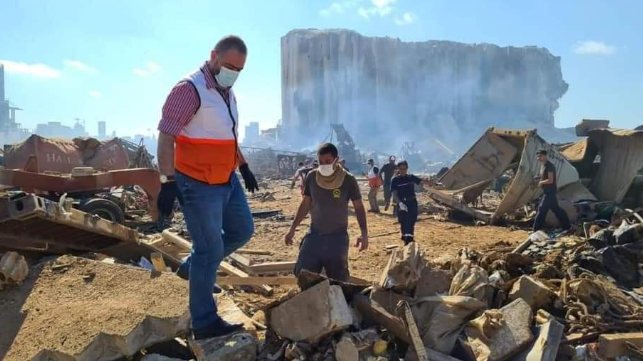Survivors Push for Independent Investigation Into Port of Beirut Blast

Survivors of the deadly blast at the Port of Beirut have revived their push for an independent investigation, hoping to bring to account the senior officials who are believed to be responsible for the explosion. Though the Lebanese courts have been conducting an investigation into the blast, the domestic investigation has been repeatedly obstructed and has failed in meeting the benchmarks based on international standards laid out by the UN Special Procedures, the survivors say.
Lebanese and international organizations, individuals, survivors and families of the victims joined the new petition, demanding an “an international, independent and impartial investigative mission” into the cause of the blast. The survivors want the United Nations Human Rights Council (UNHCR) to undertake the independent probe.
“An international investigation would not impede, but rather assist the domestic process,” said the survivors in a joint statement.
They added that the findings of an international investigation will be useful to the Lebanese authorities investigating the explosion and will help any domestic efforts to bring to justice anyone reasonably suspected of criminal responsibility.
More than a year after the explosion in Beirut’s port, which killed more than 200 people and injured about 6,000, mysteries remain about the ownership of ammonium nitrate that had been stored at the port’s precincts for years.
The cargo of ammonium nitrate entered Beirut’s port on a Moldovan-flagged ship, the Rhosus, in November 2013. The vessel was seized by port officials, and the cargo was offloaded into a hangar at Beirut's grain terminal, where it sat for the next six years.
Last year, an investigation by the Federal Bureau of Investigations (FBI) determined that the amount of ammonium nitrate that blew up at the port was about one-fifth of the shipment unloaded there in 2013, adding to suspicions that much of the cargo had gone missing.
In a recent report, the NGO Human Rights Watch concluded that evidence implicates senior Lebanese officials in the deadly explosion but systemic problems in the country’s legal and political system are allowing them to avoid accountability. The first judge to head up the Lebanese investigation, Fadi Sawan, was removed in February by two of the politicians he was attempting to investigate. His replacement, Tarek Bitar, has also run into resistance from the political establishment.
More ammonium nitrate seized
Lebanon’s National News Agency reported Saturday that authorities seized the consignment of ammonium nitrate stored inside a truck parked at a warehouse in Bekaa Valley. Ammonium nitrate is the same chemical behind the deadly 2020 explosion, though officials did not definitively tie this truckload to the same stockpile at the Port of Beirut.
The material was transported to a “safe place” by the authorities. Prime Minister Najib Mikati, who was briefed about the seizure, directed Interior Minister Bassam Mawlawi to carry out investigations on the incident. “Investigations have begun and the security forces are pursuing those involved to arrest them,” said Mawlawi.
